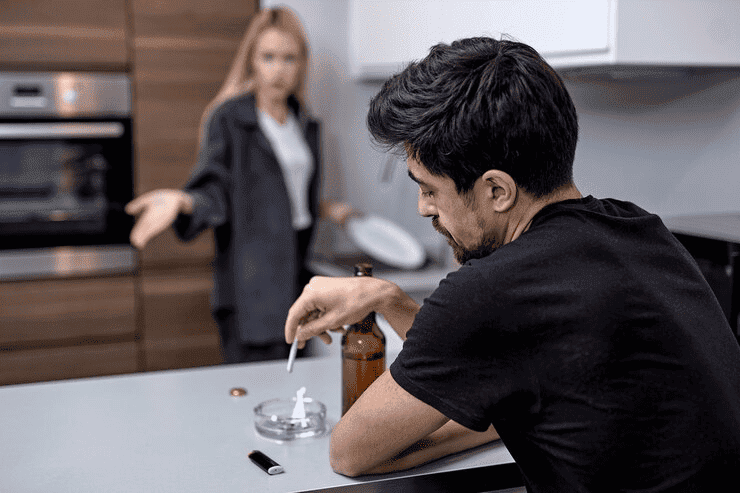Alcohol abuse is when someone drinks too much, too often, leading to harmful consequences for themselves and others. Unintentional overconsumption, tolerance development and continued drinking despite unpleasant effects are all warning signs. Seeking help from a healthcare provider, support group, or treatment program is important to overcome alcohol abuse.
Watching a parent battling alcohol abuse can be a difficult and painful situation to deal with. However, with the right support and treatment, it is possible for them to overcome their addiction and lead a healthy, fulfilling life.
If you are concerned about a parent who is battling drug or alcohol addiction, there are several steps you can take to get them the help they need:
Talk to them
The first step is to have an open and honest conversation with your parent. Express your concerns and encourage them to seek help. Be sure to approach the conversation with empathy and without judgment.
Educate yourself
Learn as much as you can about alcohol addiction and treatment options. This will help you better understand what your parent is going through and the options available for them.
Find a support group
Consider attending a support group for family members of those struggling with drinking alcohol addiction, such as Al-Anon. These groups provide a safe space to share experiences and get support from others who have been in similar situations.
Encourage professional help
Encourage your parent to seek professional help from an addiction specialist. They can provide guidance on the best treatment options for your parent’s specific needs. If you are looking for professional help related to alcoholism, Quit Alcohol is here to help.
Be patient and supportive
Recovery is a long process and can be challenging for both your parent and the entire family. Be patient, and supportive, and celebrate every milestone, no matter how small. It will give encourage individuals suffering from addiction and help them overcome the problem.
Remember that you cannot force someone to seek help, but by offering support and encouragement, you can help them take the first step toward recovery.
Signs of an Alcohol Problem
Alcohol problems can show up in a lot of different ways, and it’s important to know what signs to look out for. Some common signs include drinking by yourself or in secret, using alcohol as a way to deal with problems, having moments when you can’t remember things that happened while you were drinking, and experiencing withdrawal symptoms when you try to stop drinking.
Furthermore, there can be signs of neglecting important things like work or family because of alcohol use, continuing to drink even when it’s causing problems, drinking more than you can handle, and developing a tolerance to alcohol. These signs are very serious for an individual’s mental and physical health. If you or someone you know is going through any of these signs, it’s important to seek help or support.
Start exploring addiction rehabs
- Free & confidential helpline
- Connect with an expert rehab advisor
- Understand and review treatment options
Impact of Addiction on Parents
Parents with addiction problems can face significant challenges that can affect various aspects of their lives, including their physical and mental health, their relationships, and their responsibilities. Their children may also experience a range of negative effects, such as behavioral problems and low self-esteem. Addiction can also result in financial difficulties, legal problems, and social isolation.
Am I Overreacting To a Substance Use Problem?
It deals with the issue of whether or not someone is overreacting to a substance abuse problem. While it can be difficult to assess each unique situation, it is important to take any signs of substance abuse seriously and address them promptly. Signs that may indicate a problem include changes in behavior, mood swings, difficulty concentrating and experiencing physical symptoms.
Although it’s important to acknowledge that recovery is a process that requires time and work, it’s equally critical to approach the matter with compassion when you have concerns about someone’s substance usage and urge them to get help. Ultimately, it is better to address the problem rather than ignore it and risk worsening the situation.
How to Approach a Parent Who Is Drinking Too Much
Talking to a parent with a drinking problem can be difficult, but it is important to address the issue if you are concerned about their health and well-being. Here are some tips to help you have a productive conversation:
Choose the right time and place
Make sure that you have a quiet and private place to talk, and pick a time when your parent is sober and alert. Avoid discussing the issue during family gatherings, holidays, or other stressful times.
Use “I” statements
Start the conversation by expressing how you feel about the situation using “I” statements. For example, “I am worried about your health and well-being.” Avoid using accusatory language or placing blame.
Listen actively
Give your parent the opportunity to share their thoughts and feelings about the issue. Listen actively without interrupting or judging. Let them know that you are there to support them.
Offer support and resources
Let your parent know that you are there to support them and offer any resources that may help, such as counseling or addiction medicament programs. If you would like any assistance in finding a treatment facility for alcoholism, please contact our team of professional addiction treatment specialists today.
Set boundaries
If your parent refuses to acknowledge the problem or seek help, you may need to set boundaries to protect yourself and your family. This may include limiting contact or seeking support from a therapist or support group.
Remember that you cannot force someone to seek help, but by expressing your concerns and offering support, you can help your parent take the first step toward recovery.
Does Treatment Work?
While there is no guarantee of success, treatment for an alcoholic parent can be effective. Factors that impact success rates include the severity of the substance abuse, the treatment received, and the individual’s motivation to recover.
Detoxification, counseling, support groups, and medication-assisted treatment are all possible forms of treatment. To achieve success, it is important to tailor the treatment to the individual’s specific needs and address any underlying mental health issues.
There are medications on the market approved to treat alcohol dependence. Developing coping skills and a support network are also crucial. Ultimately, the success of the treatment will depend on the individual’s willingness to seek help and maintain sobriety. With the right resources and support, however, an alcoholic parent can overcome their drug addiction and live a healthier, happier life.
Helping the Addicted Parents
Helping an addicted parent can be a challenging and emotional experience, but it is possible to provide support and encourage them to seek help. Here are some tips for helping an addicted parent:
Educate yourself
Learn about addiction and its effects on the individual and their loved ones. This can help you better understand the situation and how to provide support.
Express concern
Talk to your parent about your concerns, using “I” statements to express how their substance use disorders affects you and your family. Avoid blaming or shaming them.
Encourage treatment
Suggest that your parent seek professional help, such as addiction medicament, counseling, or support groups. Offer to help them find resources and accompany them to appointments.
Set boundaries
It is important to set boundaries to protect yourself and your family. This may include limiting contact or refusing to engage in co-dependent behaviors.
Practice self-care
Taking care of your own physical and emotional well-being is essential when helping an addicted parent. Make sure to seek support from friends, family, or a therapist, and engage in activities that bring you joy and relaxation.
Starting With a Primary Care Doctor
Getting help for an alcoholic parent can begin with consulting a primary care doctor. The doctor will perform an assessment to evaluate the individual’s physical and mental health, which may include asking about their medical history, current medications, and symptoms. If an alcohol problem is suspected, the doctor may use a screening tool to determine the severity of the addiction.
Based on the assessment results, the doctor may refer the individual to a specialist or treatment program that is appropriate for their needs. This may include a mental health professional, counseling, or support groups. Starting with a primary care doctor can be a valuable first step in getting an alcoholic parent the necessary help and support.
Convincing a Parent to Seek a Treatment Program
Encouraging an alcoholic parent to seek treatment and quit drinking can be difficult, but there are steps that can be taken to motivate them. The first step is to approach them in a compassionate and non-judgmental way, showing concern for their well-being and health. It can also be helpful to provide specific examples of how their drinking has impacted their life and relationships.
Offering assistance and support in finding a treatment program or professional can also be beneficial. This may include supplying information on treatment options, scheduling appointments, and attending appointments with them for emotional support.
It’s essential to establish boundaries and consequences if the parent refuses to seek help, such as limiting contact or not enabling their drinking. It’s also necessary to prioritize self-care and seek support from other family members, friends, or professionals to help deal with the stress and emotions of the situation.
Ultimately, it’s up to the parent to decide to seek treatment and stop drinking, but by showing empathy, providing support, and setting boundaries, the likelihood of them seeking help can be increased.
Alcohol Abuse Treatment Options
There are different options available for treating alcohol abuse. The most effective treatment plan will vary depending on the individual’s specific needs, and may involve a combination of detoxification, inpatient or residential treatment, outpatient treatment, cognitive behavioral therapy, medication-assisted treatment, and support groups.
Recovery is a lifelong process and ongoing support is necessary to maintain sobriety. It is important to find a treatment plan that is tailored to the individual’s needs and goals in order to achieve the best possible outcome. If you are looking for treatment options for alcohol addiction please visit Quit Alcohol.
Types of Behavioral Treatments
Different behavioral treatments can be effective in treating an alcoholic parent by addressing their attitudes, behaviors, and beliefs towards alcohol use. Cognitive Behavioral Therapy (CBT) is a form of behavioral treatment that helps parents identify and replace negative thoughts and behaviors associated with alcohol use.
Motivational Enhancement Therapy (MET) aims to strengthen the parent’s motivation and commitment to overcome alcohol addiction. Family therapy involves the participation of family members to understand the addiction, improve communication and coping skills, and provide support for the parent’s recovery. Contingency Management uses positive reinforcement to incentivize the parent to stay sober and achieve treatment goals. Lastly, 12-Step Facilitation Therapy involves attending Alcoholics Anonymous (AA) meetings and utilizing its principles to aid the parent’s recovery.
Mutual-Support Groups
Mutual-support groups are peer-led organizations that provide individuals struggling with alcohol use with emotional support, practical advice, and a sense of community. These groups bring together individuals with similar experiences to share their stories and provide encouragement and support to one another. Mutual-support groups can be helpful for individuals who want to quit drinking and stay sober by providing them with a sense of accountability and a network of like-minded individuals who are also committed to sobriety. Some of the most well-known mutual-support groups include Alcoholics Anonymous (AA) and SMART Recovery, among others.
While these groups can be a valuable part of a comprehensive treatment plan, they should not be relied upon as the sole means of treatment and individuals should also seek professional medical help as needed.
What Should I Do If My Parent Is An Alcoholic And Refuses Help?
If your alcoholic parent refuses help, it can be frustrating and disheartening. However, there are still steps you can take to support your parent and protect yourself.
Set boundaries
It may be necessary to set boundaries to protect yourself and your family. This can include limiting contact with your parent or avoiding situations where alcohol is present.
Continue to express your concerns
Although your parent may refuse help at first, it is important to continue to express your concerns and offer support. Let your parent know that you care about them and are there to help when they are ready.
Consider staging an intervention
An intervention can be a way to help your parent see the impact of their drinking on themselves and those around them. An intervention can be coordinated with the help of a healthcare professional, counselor, or addiction specialist.
Seek support groups
It can be difficult to deal with a parent’s alcoholism on your own. Seek support from a therapist, support group, or other trusted individuals to help you cope and manage your own emotions.
You Can Have a Discussion By Following a Few Rules
When discussing alcoholism with a parent, it is important to follow certain guidelines that can make the conversation more productive and respectful. Selecting an appropriate time and place where both parties can speak freely and without distractions is essential. It is also crucial to approach the topic with empathy and non-judgmental language, expressing concern for the parent’s well-being and health.
Providing specific examples of how their alcohol use has impacted their lives and relationships can help to convey the seriousness of the situation. Offering assistance and support in finding a treatment program or professional can also be beneficial, while setting clear boundaries and consequences can be necessary.
In addition, prioritizing self-care and seeking support from others can help deal with the stress and emotions of the situation. Overall, demonstrating compassion, offering support, setting boundaries, and using respectful language can make the conversation with an alcoholic parent more effective.
Overcoming the Stigma of Substance Abuse Issues
The stigma of substance abuse can be a significant barrier for individuals to seek help and support. To overcome this stigma, individuals can educate others about the realities of addiction and seek out support from others who have gone through similar experiences. Remember that seeking help is a sign of strength, and surrounding yourself with supportive people committed can help with the recovery process. By taking these steps, individuals can start the journey towards recovery and a healthier life.
The Benefits of Taking Action Early
Acting early when an alcoholic parent is struggling with alcohol addiction can have several benefits. It can prevent the condition from worsening, decrease the risk of health complications, and reduce the negative impact on the parent and their family members. Early intervention can also increase the chances of a successful recovery, as the parent can receive the necessary support and treatment before the addiction becomes severe.
In addition, addressing the issue early can improve the parent’s quality of life and prevent the addiction from affecting their personal and professional relationships. Overall, taking action early can lead to a better outcome for both the parent and their family members.
Relapse Is Part of the Process
Relapse is a common part of the addiction recovery process and should not be viewed as a failure or setback. It’s important to understand that addiction is a chronic disease, and recovery is a lifelong process. Relapse can happen for various reasons, including triggers or stressors, and it doesn’t mean that the individual has failed or cannot recover.
Instead, relapse can provide an opportunity to learn and grow from the experience and recommit to the recovery process. The important thing is to seek help and support and continue working towards sobriety.
We’ve Helped Thousands of Individuals Overcome Drug and Alcohol Addiction
Seeking Help for Individuals Struggling with Addiction
It’s critical to educate yourself on addiction and treatment choices if you’re trying to support a loved one who needs assistance with addiction therapy. Friends and family can provide their loved one the support and inspiration they require to effectively navigate addiction treatment and achieve long-term recovery by adhering to these recommendations. If you want more information on addiction treatment programs please visit Quit Alcohol.





